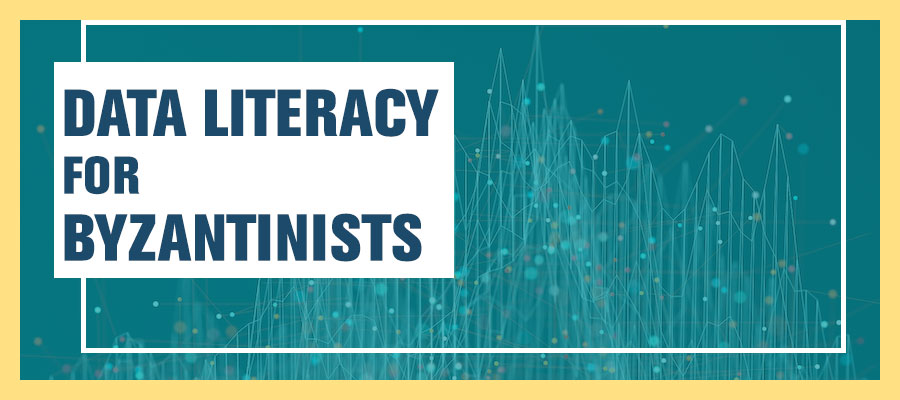Data Literacy for Byzantinists
This online workshop will offer Byzantinists an introduction to data and its management. Participants will explore the data lifecycle from creation and acquisition through analysis and visualization and learn best practices for data management. This material will be complemented by sessions touching on data analysis—particularly social network analysis—IIIF, linked open data (LOD) and the Semantic Web, the basics of Python and Jupyter Notebook, and spatial humanities and geodata. Participants will be introduced to an array of tools, such as Gephi, OpenRefine, Quarto, Recogitio, Tableau,and Voyant. Throughout the week, participants will learn the basics of GitHub, create accounts, and setup GitHub pages that will be used during the workshop. Participates will use their own data and prepared datasets to complete assigned exercises.
Course Outline
- Monday, May 13, 2024, 11:00 am–4:00 pm (EDT), including lunch break and lab time: Introduction to Databases, Data Management, and GitHub. What is a database? Metadata standards. Best practices for generating, collecting, and managing data. Virtual Research Environments. Getting started with GitHub.
- Tuesday, May 14, 2024, 11:00 am–4:00 pm (EDT), including lunch break and lab time: Data Acquisition and Network Analysis. Data sources and repositories. Data extraction. Clean and manage datasets with OpenRefine. The basics of social network analysis. Use Cytoscape and Gephi to construct and visualize a network based on your own dataset and upload it to your GitHub page.
- Wednesday, May 15, 2024, 11:00 am–4:00 pm (EDT), including lunch break and lab time: Other Types of Data and Visualizations. Images, video, and more. Data visualization basics and tools (Voyant, Tableau, TimelineJS, and more). Introduction to IIIF.
- Thursday, May 16, 2024, 11:00 am–4:00 pm (EDT), including lunch break and lab time: Linked Open Data and Geospatial Visualization. Introduction to the Semantic Web and Linked Open Data Technologies (LOD). LOD resources and cultural heritage. Data reconciliation with OpenRefine. The basics of spatial humanities, geodata, and map visualizations using LOD.
- Friday, May 17, 2024, 11:00 am–4:00 pm (EDT), including lunch break and lab time: Dissemination and Advanced Tools. Data sharing. Digital storytelling. The basics of Python and Jupyter Notebook—tabular data, geospatial, network, and visualization libraries, publish your notebook, resources for further learning.
Time Commitment & Prerequisites
- The time commitment for this workshop is 20 hours of instruction and an additional 30 minutes to an hour between sessions for practice exercises and preparation for following session. Participants are expected to attend all sessions.
Workshop Checklist
- Computer or laptop.
- Stable internet connection.
- Laptop users will find a mouse useful.
- A second screen if possible. A second screen will allow you to follow the discussion and the training on one screen while you work on the other.
- Data!
The workshop is limited to 15 participants. Registration is first come, first served. REGISTRATION IS CLOSED.
Who is eligible?
- Graduate students and early career researchers (PhD received after May 2016) in the field of Byzantine studies. Students enrolled in graduate programs in North America and early career researchers working in North America will be given priority. Graduate students and early career researchers outside of North America will be placed on a waiting list and contacted if space is available.
- All participants must be BSANA members. BSANA membership is free for graduate students and early-career contingent scholars who have earned their PhD within the last eight years and who do not hold a permanent or tenure-track appointment. If you are not already a BSANA member, please complete the BSANA Membership Form before registering for the workshop. Your membership status will be confirmed before your space in the workshop is confirmed.
This workshop is part of the partnership between the Mary Jaharis Center for Byzantine Art and Culture and the Byzantine Studies Association of North America to provide digital humanities training opportunities to graduate students and early career researchers.
